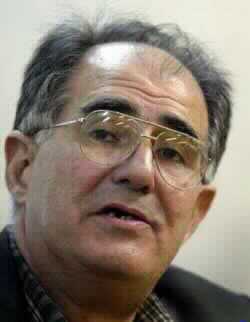UN put Iraqi scientists under scrutiny
26/12/2002| IslamWeb
 UN experts, pursuing the hunt for Iraq's elusive weapons arsenal, interviewed the head of Baghdad's Technology University after Russia disputed US claims of proof linking Iraq to international terrorism.It was the second reported meeting with Iraqi scientists since disarmament inspectors resumed their work here a month ago, but little detail about the interviews has emerged.
UN experts, pursuing the hunt for Iraq's elusive weapons arsenal, interviewed the head of Baghdad's Technology University after Russia disputed US claims of proof linking Iraq to international terrorism.It was the second reported meeting with Iraqi scientists since disarmament inspectors resumed their work here a month ago, but little detail about the interviews has emerged.
"The inspectors asked me questions about the organisation of our establishment, the names of teachers and the work of the university," Mazen Mohammad told the Arab satellite news channel al-Jazeera.
"They also asked questions about our relations with the various universities and government bodies," in Iraq.
The interview began in his offices about 9:00 am and lasted about 100 minutes as the inspectors worked on through the Christmas holiday.
The inspectors had Tuesday interviewed an Iraqi scientist privately for the first time since they resumed work on November 27.
Sabah Abdul Nur, a professor at the technology university, had previously been linked to Iraq's nuclear programme.
He said he had been interviewed by representatives of the International Atomic Energy Agency (IAEA) before the last round of inspections ended in December 1998.
The United States has urged the inspectors to use their powers under disarmament resolution 1441 to spirit Iraqi weapons scientists and their families out of the country to interview them safe from any intimidation by the Baghdad regime.
However a leading Iraqi newspaper underlined once again they would find nothing untoward.
The United States and Britain should halt their hostile policy to Baghdad and "save face" before UN weapons inspectors prove the elusive arms do not exist, Babel said.
London and Washington, "have a historic chance to save face and give up their hostile policy towards us," said the daily run by President Saddam's Hussein's elder son Uday.
President George W. Bush and Prime Minister Tony Blair "have no more excuses" to justify their policy because the weapons inspections will expose their lies about weapons of mass destruction, the daily said.
Despite all the latest technology, "the inspectors have not and will not prove that the weapons Bush and Blair speak of exist," Babel said.
Meanwhile, Russia disputed Washington's claim of having proof that Baghdad is linked to international terrorism, one of the White House's motivations for the showdown with Iraq.
"No one can provide the slightest evidence" that Iraq represented a terrorist threat, Russia's Deputy Foreign Minister Yury Fedotov was quoted by ITAR-TASS news agency as saying.
Russia, the United States and Britain, along with France and China, are the five permanent security council members, each with veto power at the 15-member council.
Russia has argued that a military campaign against Iraq must not be launched without backing from the UN Security Council.
Washington has sought to tie Iraq to Osama bin Laden's al-Qaeda terror network at the same time as it has threatened unilateral military action and accused Iraq of being in material breach of UN Security Council Resolution 1441.
And Syria, the only Arab member of the council, dismissed as "ridiculous" and "unfounded" on Wednesday accusations by Israeli Prime Minister Ariel Sharon that Iraq had transferred weapons of mass destruction to Syrian soil.
"We are certain that Iraq has recently moved chemical or biological weapons into Syria," said Sharon who strongly backs US threats to topple the Baghdad regime.
Israeli daily Haaretz reported Thursday some of the equipment -- rockets with a range between 100 and 150 kilometers (62 and 93 miles) -- allegedly transferred from Iraq to Syria is marked for Lebanon's Shiite radicals Hezbollah to attack Israel in case war breaks out.
In Britain, religious heads and leading opposition politicians expressed fear Thursday about any US-led strikes against Iraq, in messages aimed at Prime Minister Tony Blair.
Using his traditional Christmas message to call for peace, the spiritual head of the Church of England, the Archbishop of Canterbury, Rowan Williams, said it was those which society regarded as "wise men" who "can't help making the most immense mistakes of all.
"The strategists who know the possible ramifications of politics miss the huge and obvious things and wreak yet more havoc and suffering."
In a letter to the Times, Charles Kennedy, leader of the opposition Liberal Democrats, wrote: "To drift into a war without clear evidence of Iraq's current involvement in constructing and deploying weapons of mass destruction, or of its deliberate non-compliance with the inspectors, would be to risk losing the support of the international community."
In the Mirror tabloid, Blair's own Roman Catholic priest accused him of "moral surrender".
"Man must live by the will to integrity rather than the will to power," said Father Timothy Russ.
"He has had a moral surrender from his past. His positions have changed over the years," Russ added.
Pope John Paul II used his Christmas Day address to call for peace around the world.
PHOTO CAPTION
Doctor Sabah Abdul Noor, one of the first Iraqi scientist to be interviewed by U.N inspectors, speaks during a press conference in Baghdad, December 24,2002. U.N arms experts inspected Baghdad's technology college on Tuesday and interviewed nuclear scientists in their hunt for alleged Iraqi weapons of mass destruction. REUTERS/Suhaib Salem
www.islamweb.net
